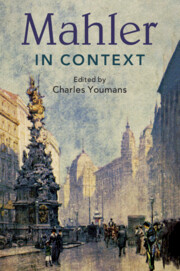Book contents
- Mahler in Context
- Composers in Context
- Mahler in Context
- Copyright page
- Dedication
- Contents
- Figures
- Music Examples
- Notes on Contributors
- Preface and Acknowledgments
- Abbreviations
- Part I Formation
- Part II Performance
- Part III Creation
- Part IV Mind, Body, Spirit
- Chapter 20 Organized Religion
- Chapter 21 German Idealism
- Chapter 22 Nietzsche
- Chapter 23 Fechner
- Chapter 24 Literary Enthusiasms
- Chapter 25 Romantic Relationships
- Chapter 26 Mahler and Death
- Part V Influence
- Further Reading
- Index
Chapter 26 - Mahler and Death
from Part IV - Mind, Body, Spirit
Published online by Cambridge University Press: 18 December 2020
- Mahler in Context
- Composers in Context
- Mahler in Context
- Copyright page
- Dedication
- Contents
- Figures
- Music Examples
- Notes on Contributors
- Preface and Acknowledgments
- Abbreviations
- Part I Formation
- Part II Performance
- Part III Creation
- Part IV Mind, Body, Spirit
- Chapter 20 Organized Religion
- Chapter 21 German Idealism
- Chapter 22 Nietzsche
- Chapter 23 Fechner
- Chapter 24 Literary Enthusiasms
- Chapter 25 Romantic Relationships
- Chapter 26 Mahler and Death
- Part V Influence
- Further Reading
- Index
Summary
Mahler’s “lifelong romance with death” (Stuart Feder) was one of his central preoccupations, both in his creative work and in his day-to-day existence. Death is ubiquitous in Mahler’s music, from his first major work, Das klagende Lied, which concerns fratricide and its consequences, to the unfinished Tenth Symphony, in which the final movement reproduces the sound of funeral drums. Privately, it was not only something to be feared but an experience to be desired; the lines “sterben werd’ ich, um zu leben” (I will die, in order to live), the first line of the final strophe of Mahler’s Second Symphony, encapsulate a worldview that he renewed wholeheartedly in the Eighth. The various influences on this orientation are surveyed here, with special attention to poets (Goethe, Klopstock, Rückert) and philosophers (Fechner, Hartmann) who intensified what seems to have been a natural predilection.
- Type
- Chapter
- Information
- Mahler in Context , pp. 225 - 232Publisher: Cambridge University PressPrint publication year: 2020

